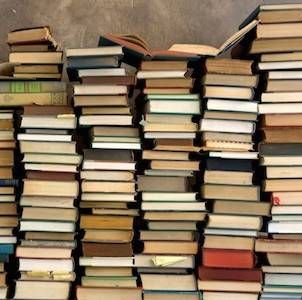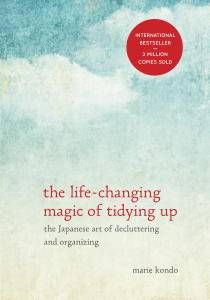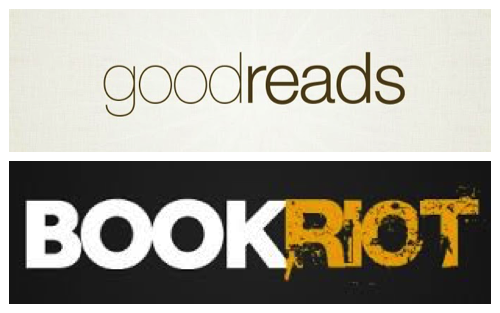
Why We Hold On To Books (and Why I’m Pruning My Library)
I wonder if other people find themselves a bit imitative of the books they read and the worlds they encounter in them? I can’t be the only one, right? I’m aware of it, but don’t try to stop it because I think it’s kind of fun. I enjoy the goofy week-long hangover after I go on a Sherlock Holmes binge, where I wander around town studying people intensely and memorizing details (All of which are useless so far. I’ve solved zero crimes. Uncool.)
It happens a lot with nonfiction, in particular. When I read memoirs by runners, my running definitely became improved for a few weeks, for example. When I read the excellent Dirty Secret by Jessie Sholl – a book about a daughter dealing with her mother, who is a hoarder – I definitely went around the house throwing things away and cleaning out closets. That one stuck around longest, as I slowly discovered that I work poorly and become frazzled in a messy environment, but chill out in a clean one. I realized that I have to clean everything around me, or at least organize it, before I can sit down to write. Realizing that was an amazing productivity boost.
 More recently, I’ve been reading The Life-Changing Magic of Tidying Up by Marie Kondo, a book I discovered via this article. It’s an excellent read so far, but it also hit me right as I was beginning to stare at my bookshelves and realize how many books I own that I just am never going to read.
More recently, I’ve been reading The Life-Changing Magic of Tidying Up by Marie Kondo, a book I discovered via this article. It’s an excellent read so far, but it also hit me right as I was beginning to stare at my bookshelves and realize how many books I own that I just am never going to read.
So I’ve decided it’s time to gut my shelves.
Books I’m gonna read, or gonna re-read, they can stay. Books that really matter, of course those stay. But why do I own ten Shannara books by Terry Brooks, when I just have zero interest in high fantasy? What eventual future day are they waiting for, and why do I have to have them taking up shelf space waiting for it? If in ten years I get that desperate to read ’em, I can go buy a copy then. I don’t need to hoard books for every eventuality.
So, books going into boxes and off to bookstores and places that can use ’em. What’s more interesting to me, though, is why there are so many books? What’s the mental process that lead to so many bookshelves, and a discomfort at getting rid of them for so long until now? What makes some of us accumulate so many books?
I can only speak for myself, but since I’m not that remarkable, I tend to expect my own reasons are fairly applicable to plenty of other people, so I find it interesting to lay them out.
For one thing, I’m realizing that there is some sort of prestige element behind all of these bookshelves. In some unconscious way, having so many bookshelves means that when anyone comes over, I am saying to them look at how smart I definitely am! I sure have read a bazillion books! Look upon me and tremble, puny human! (That last line, I say out loud. I don’t get invited to many parties anymore.)
Objectively, this is just silly, when it’s put down on paper like this. Who am I trying to impress, exactly? Hell if I know. Nobody is coming over and, depending on how smart my living room makes me seem, writing me a large check. Mostly friends come over, and they already know whatever level of smarts I’ve got. My brain indicates that, for good or for ill, far more than walls and walls of bookshelves.
But what else is there? I have a theory that it’s because I grew up relatively poor, and that element of my childhood was braided tightly with the deep importance books carried, whether it was at home or in libraries. Books matter, but also they cost a bit of cash, and that’s nothing to sneer at when you’re poor. Stephen King has a great quote I’m paraphrasing here, which is that he knew he’d made it when he could buy hardcovers without blinking. I said “yes, exactly” when I read that. He got it precisely right. So when books matter, and they cost money, then you tend to hang onto the books that come into your life.
What’s changed here is hardly that I’ve become affluent, so much as I’ve come to view books as a fluid thing. They can flow into my life as easily as they can flow back out of my life, and I might be happier navigating those currents, rather than trying to dam up this river of books so that somehow not a single one ever escapes my grasp.
(An aside: I also wonder, without evidence, if hoarding books is a particular artifact of books themselves, their long history of being rare and valuable things? And even now, when we live in an age of bookish abundance, we have a leftover primitive reader-brain eager to hang onto every page we can manage. I don’t know, but it makes some sense to me.)
In The Life Changing Magic of Tidying Up, Marie Kondo suggests that you should take each item in your home in hand, and you should keep the ones that spark joy and work to discard the rest. Among her other strategies and writings, I happen to think this particular point applies particularly well to books. What if I went through the shelves, held each book, and worked out what cannot be parted with from the ones that obviously can? I think I can know my own tastes well enough, now and in the immediate-enough future, to know what unread books should hang around. And if I want to read the other ones in the further-out future…well, that is that future’s problem.
All of this comes off as New Year Resolution stuff, but it isn’t, because I’m starting it even as I’m writing this article. Mostly, this is me considering why we own so many books sometimes, or perhaps it’s just me suggesting you read The Life Changing Magic of Tidying Up and then go get rid of some dusty books and some weird toe socks you don’t wear anymore. There’s worse ways to start a new year than with less stuff, it seems to me, especially stuff that doesn’t actively give you joy. We all need more joy, simple as that.
____________________
Like chattin’ up other readers and keeping track of your books on Goodreads? So do we! Come give us a follow.









